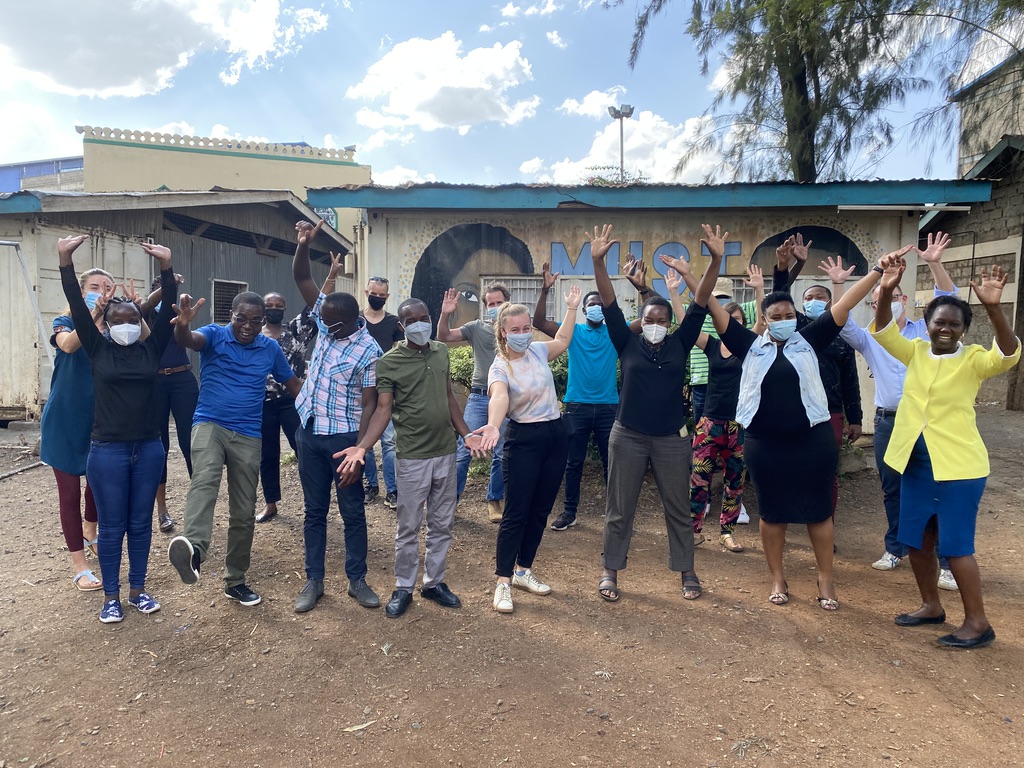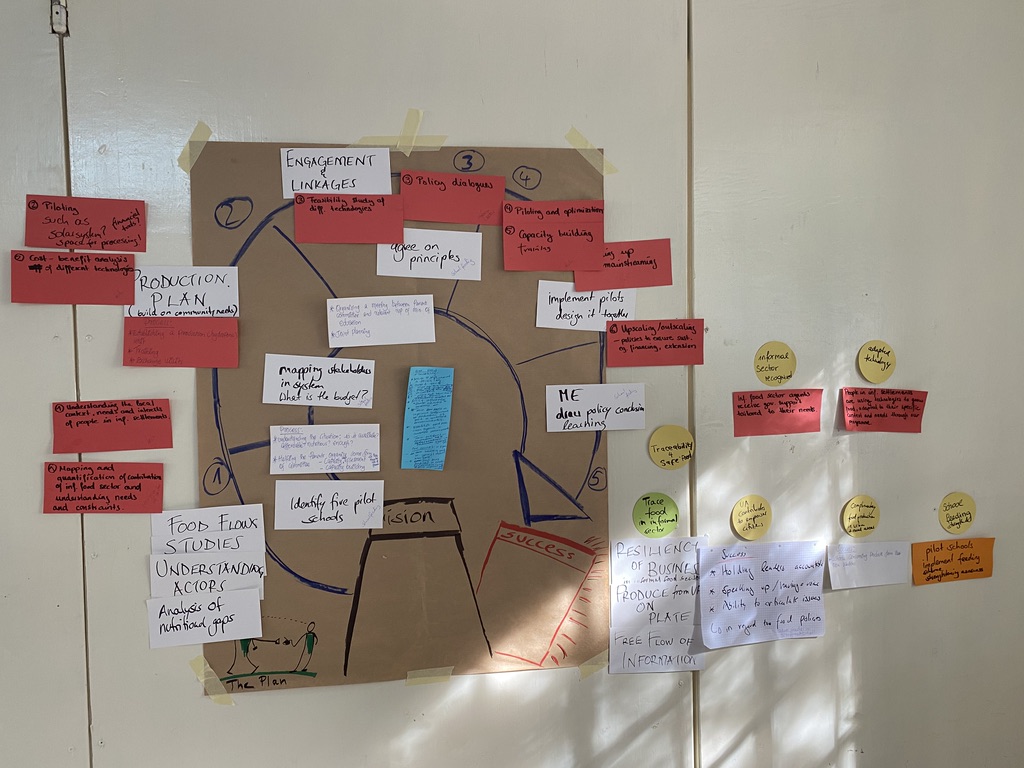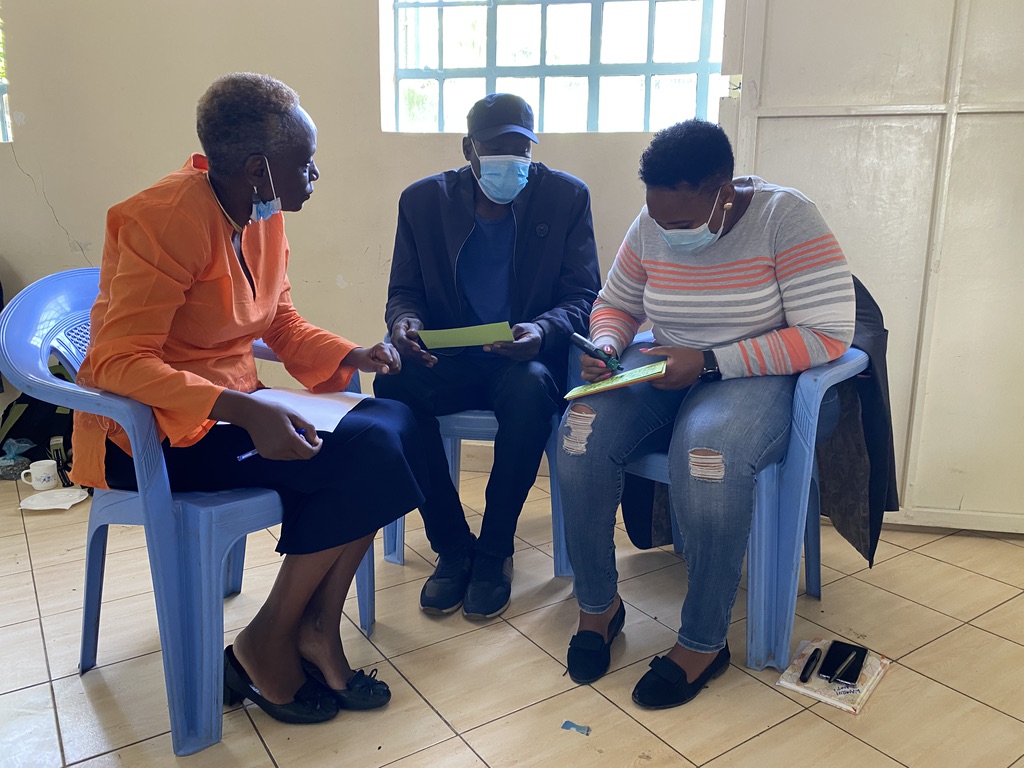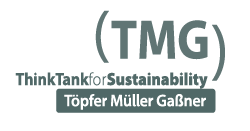Towards more inclusive and resilient food systems for Nairobi's informal settlements
Partner workshop charts transformative pathways for Nairobi's informal urban settlements
by Louisa Nelle and Wangu Mwangi | 2021-12-09

From the outset, TMG's recent reflection and planning session with partners of the Urban Food Futures programme aimed to go beyond business as usual. Rather than bringing partners to a hotel in one of Nairobi's more affluent areas, the workshop took place within the sprawling Mukuru informal settlement in the eastern part of Nairobi.
Our host, Mukuru Skills Training Centre, seeks to create "an oasis of hope" for neighbourhood youth by equipping them with practical and entrepreneurial skills, such as hairdressing, masonry, hospitality, plumbing, and computer training. Tasked with preparing and serving all the meals, as well as providing other workshop services, the Centre's trainees gained practical experience in interacting with a diverse range of clients, while the Centre was able to earn much-needed additional income. As the Manager commented, "thanks to your support, we will be able to host a staff Christmas party this year!"

The Urban Food Futures team at the Mukuru Skills facilities.
Such practical engagement with organisations at the frontline of community development is at the heart of the Urban Food Future's approach. Yet it is difficult to underestimate the scale of the challenge. During a guided walk of the surrounding Mukuru Viwandani settlement, workshop participants were directly confronted with the consequences of decades of systemic marginalisation and government disinterest. Muddy paths led through the tightly packed iron houses next to the highly polluted Ngong river - thanks to the impunity enjoyed by owners of industries immediately upstream.
Locally-embedded support networks critical
But Mukuru residents are daring to dream of a better future thanks to the stubborn optimism of umbrella coalition, Muungano wa Wanavijiji, which describes itself as "a social movement of 'slum' residents and urban poor people in Kenya." Muungano works closely with a network of community-based organisations, such as Mukuru Skills, which are in turn linked to a web of public schools, health centres and other community-based services that receive support from faith-based and philantrophic organisations, as well as NGO networks.
The Kenyan Government declared Mukuru a Special Planning Area (SPA) in 2017, the first of its kind in Africa. The ambitious project is spearheaded by grassroots organisations such as Muungano who closely involved the community in consultations and data collection. Not an easy task with an estimated population of up to 400,000 people. While accompanied by some social tensions and illegal evictions, the Mukuru process has nevertheless largely avoided the fate of slum upgrading projects in other parts of the city, which have resulted in large-scale displacement of residents.
By organising numerous consultations and protests, Mukuru residents have had some success in preventing planned evictions, while also strengthening solidarity and local advocacy capacities.

Whose vision?
Despite temporarily "relocating" to Mukuru, the assembled project partners were conscious that it was not their place to envision a future "on behalf of" local communities. During the discussions, concern was expressed that proposed project goals, such as promoting sustainable urban farming practices for food security and resilient livelihoods, should be articulated directly by those directly affected. The role of the project as a "mediator" between residents of informal settlements and higher-level food system planning and policy-making processes was repeatedly underscored.

The Muungano wa Wanavijiji team at the workshop.
As one participant noted, a focus on inclusive governance means that urban farming "becomes much more than growing carrots and spinach." The project hence becomes a conduit for residents of Mukuru to strengthen their dignity by shifting the focus from fighting for the right "to be fed," towards greater agency and decision-making power over what to eat and how to access that food.
In addition to the four main project partners - Muungano wa Wanavijiji, Miramar College, ICRAF, and ICRISAT - the workshop drew a number of strategic research collaborators, the African Population and Health Research Centre (APHRC), and the Nairobi office of the UN Food and Agriculture Organization (FAO).
 Urban Food FuturesFeb 09, 2026
Urban Food FuturesFeb 09, 2026Pushing the horizon: Urban farming and community-led innovation in Mukuru informal settlement
A small community-run greenhouse in Mukuru is offering insights into how controlled-environment agriculture can strengthen food security in urban environments under increasing pressure—and a look into the future of food systems in informal settlements.
Christian Sonntag, Emmanuel Atamba, Lumi Youm
 Land GovernanceDec 18, 2025
Land GovernanceDec 18, 2025Land tenure, women’s land rights, and resilience: Reflections from CRIC23 toward UNCCD COP17
Our experts discuss what the exchanges at CRIC23 highlighted and revealed about the role of secure and gender-equitable land tenure in the UNCCD's work ahead of the 2026 triple COP year.
Frederike Klümper, Washe Kazungu
 Urban Food FuturesDec 09, 2025
Urban Food FuturesDec 09, 2025The story of Mukuru's Urban Nutrition Hub
In Mukuru informal settlement, a safe haven for women has grown into the Urban Nutrition Hub, a multi-purpose space for nutrition education, training, and community development, demonstrating the potential of grassroots community-owned innovation..
Serah Kiragu-Wissler


